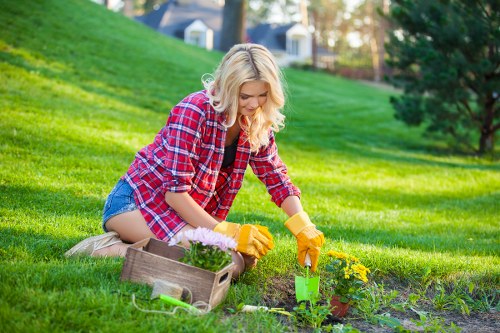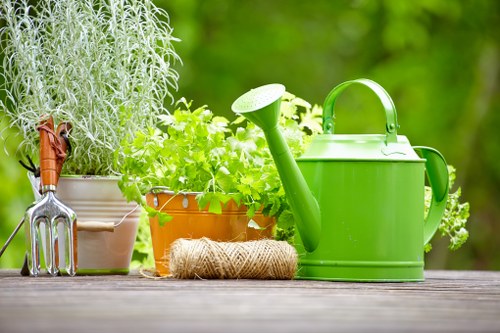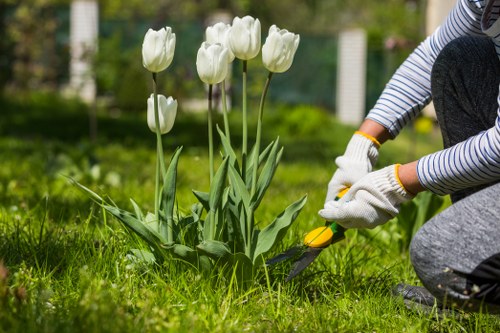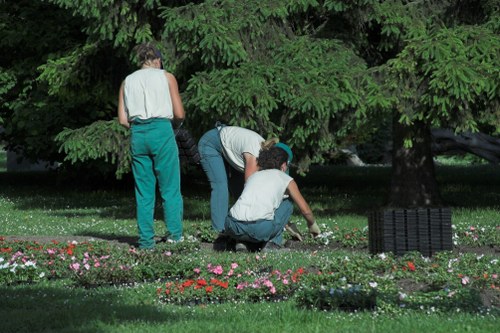Garden Fence Installation South Harrow

Transforming your garden into a safe and beautiful space starts with the right garden fence installation in South Harrow. Whether you're looking to add privacy, enhance security, or simply beautify your outdoor area, installing a garden fence is a crucial step. This article will guide you through everything you need to know about garden fence installation in South Harrow, ensuring you make an informed decision that suits your needs and enhances your property.
South Harrow is a vibrant area with a mix of residential homes and lush gardens. A well-installed fence can not only add aesthetic value but also increase the property’s value. Understanding the different types of fences, materials, and installation processes is essential for achieving the desired outcome.
In this guide, we will cover the various aspects of garden fence installation, including choosing the right materials, understanding local regulations, and maintaining your fence to ensure it lasts for years to come.

Why Choose Garden Fences?
Garden fences serve multiple purposes, making them a valuable addition to any property in South Harrow. Here are some key reasons why you should consider installing a garden fence:
- Privacy: Create a secluded space where you can relax without worrying about onlookers.
- Security: Deter unwanted visitors and protect your property and loved ones.
- Aesthetic Appeal: Enhance the visual appeal of your garden with designs that complement your home.
- Boundary Definition: Clearly mark your property lines to prevent disputes with neighbors.
- Pet Safety: Ensure your pets can enjoy the garden safely without the risk of escaping.
By addressing these needs, garden fences contribute significantly to the functionality and beauty of your outdoor space.
Choosing the right fence type and material can help you maximize these benefits, making it essential to consider your specific requirements and preferences.
Next, we’ll explore the different types of garden fences suitable for South Harrow homes.

Types of Garden Fences
Wooden Fences
Wooden fences are a popular choice due to their natural appearance and versatility. They can be customized to fit various styles, from traditional to modern.
Pros:
- Natural and timeless look
- Customizable designs and heights
- Environmentally friendly option
Cons:
- Requires regular maintenance
- Prone to weather damage and rot
Metal Fences
Metal fences, including wrought iron and aluminum, offer durability and a sleek appearance. They are ideal for security while adding a touch of elegance.
Pros:
- Highly durable and low maintenance
- Elegant and timeless aesthetic
- Provides better security
Cons:
- Higher initial cost
- Can be susceptible to rust (depending on the material)
Vinyl Fences
Vinyl fencing is an increasingly popular choice due to its durability and low maintenance requirements. It mimics the look of wood without the associated upkeep.
Pros:
- Low maintenance and long-lasting
- Resistant to weather and pests
- Wide variety of styles and colors
Cons:
- Can be more expensive initially
- Limited customization compared to wood
Each type of fence has its own advantages and drawbacks, so it's important to weigh these factors based on your specific needs and preferences.
Next, let's look at the materials commonly used in garden fence installations.

Choosing the Right Materials
Wood
Wood is a classic choice for garden fences, offering a warm and natural aesthetic. Common types of wood used include cedar, pine, and spruce, each with its own characteristics.
Cedar:
- Natural resistance to decay and insects
- Beautiful grain and color
- Higher cost
Pine:
- Affordable and widely available
- Easily customizable
- Requires regular maintenance
Spruce:
- Lightweight and easy to work with
- Good for painted or stained finishes
- Less durable without proper treatment
Metal
Metal fences, such as wrought iron or aluminum, offer a sturdy and elegant option. They are ideal for those seeking a fence that requires minimal upkeep.
Wrought Iron:
- Highly durable and strong
- Ornate designs available
- Can be expensive
Aluminum:
- Lightweight and easy to install
- Resistant to rust and corrosion
- Less secure than wrought iron
Vinyl
Vinyl fences are made from PVC and offer a maintenance-free alternative to traditional materials. They come in a variety of styles and colors to suit any garden.
Pros:
- No need for painting or staining
- Resistant to moisture and pests
- Wide range of design options
Cons:
- Can warp in extreme temperatures
- Limited structural strength compared to metal
Selecting the right material depends on your budget, desired look, and how much maintenance you're willing to perform.
After choosing the material, understanding the installation process is the next step.

Installation Process
Planning and Measurement
Before installation, it's crucial to plan and measure your garden area accurately. Determine the fence height, length, and any specific design features you want to include.
Steps:
- Mark the boundary of your garden.
- Decide on the fence height based on your needs and local regulations.
- Measure the total length to estimate the amount of materials required.
Preparing the Site
Proper site preparation ensures a stable and long-lasting fence. Clear the area of any obstacles and ensure the ground is level.
Steps:
- Remove any debris or vegetation along the fence line.
- Check for underground utilities before digging.
- Level the ground to provide a solid foundation for the fence posts.
Installing Fence Posts
Fence posts are the backbone of your garden fence. Installing them correctly is essential for stability and durability.
Steps:
- Dive holes for the posts using a post hole digger.
- Place the posts in the holes and ensure they are straight.
- Fill the holes with concrete to secure the posts.
- Allow the concrete to set for at least 24 hours before proceeding.
Attaching Fence Panels
Once the posts are set, attach the fence panels or individual boards to complete the fence structure.
Steps:
- Start from one end and work towards the other.
- Use appropriate fasteners to secure the panels to the posts.
- Ensure each panel is level and evenly spaced.
Finishing Touches
Add any additional features such as gates, decorative elements, or protective coatings to enhance the fence's appearance and functionality.
Steps:
- Install gates if needed, ensuring they are properly aligned and secure.
- Apply paint, stain, or sealant if using wood for added protection.
- Inspect the entire fence for any loose or unstable sections.
A successful installation requires careful planning and execution. If you're unsure about any step, consider hiring a professional to ensure the best results.

Local Regulations and Permits
Before installing a garden fence in South Harrow, it's important to be aware of local regulations and obtain any necessary permits. These rules are in place to ensure that fences are safe, meet community standards, and do not infringe on neighboring properties.
Understanding Zoning Laws
Local zoning laws dictate the height, materials, and placement of fences. In South Harrow, typical regulations might include:
- Height Restrictions: Generally, fences should not exceed 6 feet in height, but this can vary.
- Boundary Setbacks: Fences must be set back a certain distance from property lines and roads.
- Material Guidelines: Certain materials may be restricted to maintain the area's aesthetic.
Permit Requirements
Depending on the fence's height and location, you may need a permit from the local council. Failure to obtain the necessary permits can result in fines or the need to remove the fence.
Steps to Obtain a Permit:
- Contact the South Harrow local council to inquire about specific requirements.
- Submit a fence plan detailing the design, materials, and placement.
- Pay any associated fees.
- Wait for approval before commencing installation.
Neighbor Agreements
It's courteous to inform your neighbors about your fence installation plans, especially if the fence is near the property line. Discussing the project can prevent potential disputes and ensure you both agree on the fence's placement and design.
Adhering to local regulations and maintaining good neighborly relations are essential for a smooth fence installation process.
Next, we’ll discuss maintenance tips to keep your fence looking great for years.

Fence Maintenance Tips
Maintaining your garden fence is crucial for ensuring its longevity and appearance. Regular maintenance helps prevent damage from weather, pests, and wear and tear.
Wooden Fences
Wooden fences require the most maintenance but can offer a beautiful, natural look when cared for properly.
Maintenance Tips:
- Inspect for rot or damage at least twice a year.
- Apply a protective sealant or paint every few years.
- Clean the fence regularly to remove dirt and debris.
- Replace any damaged boards promptly.
Metal Fences
Metal fences are durable but still need occasional maintenance to prevent rust and corrosion.
Maintenance Tips:
- Regularly check for rust spots and treat them immediately.
- Clean the fence with a mild detergent to remove grime.
- Inspect and tighten any loose fasteners or bolts.
Vinyl Fences
Vinyl fences are low-maintenance but still benefit from regular care to keep them looking their best.
Maintenance Tips:
- Wash the fence with soap and water to remove stains.
- Inspect for cracks or damage and repair as needed.
- Avoid using abrasive cleaners that can scratch the surface.
General Maintenance Tips
- Trim any vegetation that may grow near the fence to prevent damage.
- Check the foundation and posts regularly for stability.
- Address any issues promptly to prevent minor problems from becoming major repairs.
By following these maintenance tips, you can ensure that your garden fence remains functional and attractive for many years.
Next, we’ll explore the costs associated with garden fence installation in South Harrow.

Cost of Garden Fence Installation
Understanding the costs involved in garden fence installation helps you budget effectively. Several factors influence the overall cost, including materials, fence height, length, and labor.
Material Costs
The choice of materials significantly impacts the cost. Here’s a breakdown of common materials:
- Wood: £20 - £50 per meter
- Metal: £30 - £70 per meter
- Vinyl: £25 - £60 per meter
Higher-end materials like wrought iron can increase costs, while more affordable options like basic pine can reduce expenses.
Installation Costs
Professional installation ensures a sturdy and aesthetically pleasing fence. Labor costs in South Harrow typically range from £40 to £70 per hour, depending on the complexity of the project.
Additional Costs
- Permits: £50 - £200 depending on local regulations
- Gates: £100 - £300 each, depending on size and material
- Finishing: £5 - £15 per meter for paint or stain
Estimating Total Costs
To estimate the total cost of your garden fence installation:
- Measure the total length of the fence.
- Choose the desired material and calculate material costs.
- Add labor costs based on the estimated time for installation.
- Include any additional costs like permits or gates.
For example, installing a 20-meter wooden fence might cost between £1,200 and £2,200, including materials, labor, and additional expenses.
Next, we’ll discuss some design ideas to inspire your garden fence installation.

Garden Fence Design Ideas
Choosing the right design for your garden fence can enhance the beauty and functionality of your outdoor space. Here are some popular design ideas to consider:
Classic Picket Fences
Picket fences offer a charming and timeless look. They are perfect for those who want a traditional aesthetic.
Features:
- Regularly spaced vertical boards
- Decorative tops like scallops or points
- Painted in bright colors or white
Modern Sleek Fences
For a contemporary look, modern fences with clean lines and minimalistic designs are ideal.
Features:
- Horizontal or vertical metal or wood panels
- Neutral colors like black, white, or grey
- Simple and elegant design
Lattice Fences
Lattice fences add a decorative element while providing partial privacy. They are versatile and can be combined with climbing plants.
Features:
- Crisscrossed patterns of wood or vinyl
- Allows light and air to pass through
- Great for adding vertical interest to your garden
Hobby Fences
Hobby fences are semi-transparent and provide a balance between privacy and visibility. They often feature decorative patterns or materials.
Features:
- Decorative elements like finials or lattice
- Partial privacy without completely blocking views
- Can be made from various materials including wood and metal
Garden Rolls and Panels
Pre-made garden rolls and panels are easy to install and offer a variety of styles and materials.
Features:
- Flexibility in height and length
- Various materials available
- Quick and easy installation
Selecting a design that complements your home's architecture and your garden's style will enhance the overall appeal of your property.
Next, we'll explore the local areas surrounding South Harrow where garden fence installation services are available.

Nearby Areas for Garden Fence Installation
South Harrow is surrounded by several charming neighborhoods that also require quality garden fence installation. Here are some of the closest areas to South Harrow where you can find reliable fence installation services:
- West Harrow Just west of South Harrow, offering lush gardens and a variety of fencing options.
- East Harrow: Known for its spacious properties, East Harrow residents often seek privacy-enhancing fences.
- Kenton A nearby area with diverse garden styles, perfect for customized fence solutions.
- North Harrow Popular for its green spaces, requiring durable and attractive fencing.
- Southall A vibrant community where decorative fences add to the local charm.
- Wealdstone Close to South Harrow, homeowners here prefer low-maintenance fencing options.
- Sudbury Offers a mix of modern and traditional homes, necessitating versatile fence designs.
- Rayners Lane: A bustling area where sleek, modern fences are in high demand.
- Ruislip Known for its picturesque gardens, requiring aesthetic fencing solutions.
- Greenford Residents often choose metal or wooden fences for their durability and style.
- Acton Green: A nearby area where eco-friendly fencing materials are popular.
- Elthorne Park: Homeowners here prefer elegant and secure fencing options.
- Headstone Lane: Offering a variety of garden styles, requiring customized fence installations.
- Park Royal: An industrial area where practical and robust fencing solutions are needed.
- Kenton: Known for its family-friendly environment, requiring safe and secure fences.
Each of these areas has unique features that influence the type of fence installation most suitable. Whether you’re looking for privacy, security, or aesthetic enhancement, professionals in these neighborhoods can cater to your specific needs.
Now, let’s move on to some frequently asked questions about garden fence installation in South Harrow.

Frequently Asked Questions
1. How long does it take to install a garden fence in South Harrow?
The installation time varies depending on the fence type, length, and complexity of the project. On average, a standard fence installation can take anywhere from a few days to a week.
2. Do I need a permit to install a garden fence in South Harrow?
It depends on the fence's height and location. It’s best to check with the South Harrow local council to determine if a permit is required for your specific project.
3. What maintenance is required for a wooden fence?
Wooden fences require regular maintenance, including painting or staining, checking for rot or damage, and cleaning to prevent debris buildup.
4. Can I install a fence myself, or should I hire a professional?
While smaller projects might be manageable for DIY enthusiasts, hiring a professional ensures that the fence is installed correctly and meets all local regulations.
5. What is the most durable fencing material for South Harrow gardens?
Metal fences, such as wrought iron or aluminum, are among the most durable options. They require minimal maintenance and can withstand various weather conditions.